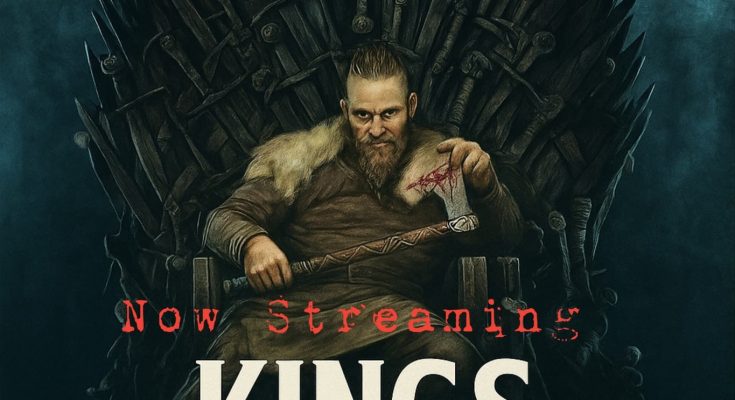“Kings of Norway: Netflix’s Epic Viking Saga of Power and Blood” is poised to become one of Netflix’s most ambitious historical dramas to date, a sweeping retelling of Norway’s Viking past that blends history, myth, and cinematic intensity into a sprawling epic. The series is being positioned not just as another entry into the growing Viking-themed entertainment landscape, but as a definitive retelling of the tumultuous rise of Norway’s monarchs, the shifting tides of power, and the battles fought in blood and fire to forge a kingdom out of chaos. With Netflix investing heavily in international productions that appeal to a global audience, “Kings of Norway” seeks to deliver a series that combines authenticity with the grandeur of modern television storytelling, ensuring that it captivates both history enthusiasts and casual viewers hungry for action, intrigue, and drama.
The Viking Age has always been fertile ground for storytellers. For decades, tales of Norse raiders, explorers, and kings have fascinated audiences, from classic literature to Hollywood films and, more recently, television dramas. Yet what sets “Kings of Norway” apart is its stated mission to dive deeply into the actual sagas and chronicles that shaped the mythos of Norway’s founding kings, weaving together multiple narrative threads into a saga that is as much about politics and legacy as it is about swords and ships. The series promises to trace the journeys of legendary figures like Harald Fairhair, who is often credited with unifying Norway under a single crown, while also exploring the rivalries, betrayals, and shifting alliances that defined the Norse world. By grounding its narrative in the historical sources—while still taking the creative liberties necessary for dramatic television—the show is expected to bring audiences closer to the raw essence of Viking power struggles.
The story of Norway’s unification is one steeped in violence, ambition, and cultural transformation. Before Harald Fairhair’s rise, the region we now know as Norway was fractured into dozens of petty kingdoms, each ruled by chieftains who guarded their territories fiercely. Power was decentralized, and loyalty often shifted with the winds of battle. In this chaotic world, honor and blood ties carried enormous weight, yet betrayal and treachery were equally commonplace. “Kings of Norway” intends to dramatize these tensions, portraying how Harald, through a combination of military might, strategic marriages, and ruthless determination, managed to consolidate power. Yet the series also highlights the human cost of such ambition: the wars that ravaged villages, the displacement of people, and the deep scars left behind on those who lived through these transformations.
Beyond the battlefield, the show aims to delve into the cultural and spiritual dimensions of Viking society. Norse mythology, with its pantheon of gods and epic tales, was not merely entertainment but a guiding worldview for the people of the time. The rites, sacrifices, and belief in fate shaped how warriors approached life and death. In “Kings of Norway,” viewers will see not only the clash of armies but also the clash of belief systems, especially as Christianity begins to penetrate the Norse lands. The tension between old gods and new faith is one of the most dramatic shifts in Scandinavian history, and the series promises to treat it with the complexity it deserves. The arrival of Christianity did not merely replace Norse religion overnight; instead, it created decades of friction, hybrid practices, and political maneuvering, as kings recognized the strategic advantage of aligning with the new faith to secure legitimacy in the eyes of Europe.
Visually, the series is expected to be nothing short of spectacular. Filming on location in Norway and other parts of Scandinavia, the production is leaning heavily on the natural beauty of fjords, mountains, and rugged coastlines to provide authenticity. These landscapes are not just backdrops but characters in their own right, reflecting the harshness and majesty of the world in which the Vikings lived. The longships, painstakingly recreated with historical accuracy, will carry warriors across icy seas, while great halls lit by fire will become the stage for councils, feasts, and betrayals. Netflix’s budget ensures that battle sequences will be grand in scale, with choreographed combat scenes designed to convey the brutal reality of Viking warfare rather than a romanticized version. Blood, mud, and steel will dominate the screen, immersing viewers in the visceral experience of survival and conquest.
But for all its battles and bloodshed, “Kings of Norway” is, at its heart, a drama about people. The kings and warriors who shaped history were not faceless figures; they were human beings driven by ambition, love, pride, jealousy, and fear. The series intends to peel back the layers of myth to reveal the individuals behind the crowns. Harald Fairhair’s obsession with unification, for example, may be portrayed not only as a political mission but as a deeply personal journey, shaped by his relationships and his desire for legacy. The women of the saga are also expected to play pivotal roles. Too often overlooked in Viking narratives, Norse women held significant power and influence, both within households and in politics. Figures such as queens, priestesses, and shieldmaidens will feature prominently, showing that the saga of Norway’s kings was not written by men alone.
Netflix’s track record with historical dramas suggests that “Kings of Norway” will appeal to a broad audience. The success of shows like “The Last Kingdom” and “Vikings: Valhalla” demonstrates that there is a global appetite for stories set in the Viking Age. Yet this new series is not content to simply follow in their footsteps. While “The Last Kingdom” told the story of England through the eyes of Saxons and Danes, and “Vikings: Valhalla” expanded upon the legacy of Ragnar Lothbrok’s descendants, “Kings of Norway” narrows its focus on the unique story of Norway’s monarchy. In doing so, it promises a fresh perspective, one that both complements and distinguishes itself from previous Viking dramas. For viewers already invested in the genre, it offers new tales and unfamiliar figures, while newcomers will find an accessible entry point into a world of epic storytelling.
Casting choices will also be critical to the success of the series. Early reports suggest that the production is seeking actors with Scandinavian roots to bring authenticity to the roles. The importance of language, dialect, and cultural representation cannot be overstated, as audiences increasingly demand historical dramas that feel genuine rather than staged. At the same time, Netflix is balancing authenticity with accessibility, ensuring that the dialogue resonates with international viewers while maintaining a sense of historical flavor. The performances will be central to making the larger-than-life figures relatable, grounding the mythic aura of kings and warriors in the emotional reality of human struggle.
Thematically, “Kings of Norway” touches on universal questions that transcend its historical setting. What does it mean to pursue power at all costs? How far should one go to unite a divided land? Is the sacrifice of thousands justified in the name of a single crown? These are questions that resonate not only within the Viking Age but throughout human history, and even in contemporary politics. By exploring these timeless dilemmas, the series positions itself as more than just entertainment; it becomes a meditation on the nature of leadership, ambition, and the consequences of power. Viewers will likely see echoes of modern struggles in the saga of Norway’s kings, reminding them that history, while distant, is never entirely divorced from the present.
The global reach of Netflix ensures that “Kings of Norway” will carry Norway’s Viking heritage to millions of households around the world. For Norwegians, the series may serve as a source of cultural pride, bringing to life their national origins in a way that resonates with global audiences. For international viewers, it opens a window into a history that may be less familiar than that of England or France, yet no less compelling. By investing in such stories, Netflix continues its strategy of leveraging local histories and legends to create global hits, blending cultural specificity with universal themes of power, faith, and survival.
As anticipation builds, there is little doubt that “Kings of Norway: Netflix’s Epic Viking Saga of Power and Blood” has the potential to redefine how audiences perceive Viking dramas. With its focus on Norway’s founding monarchs, its balance of historical depth and dramatic flair, and its commitment to high production values, the series is positioned to become a cultural phenomenon. Audiences can expect not only the thrill of battle scenes and the grandeur of epic storytelling but also the intimate human dramas that make history truly come alive. When the longships sail across the screen and the clash of swords echoes through the fjords, viewers will be transported into a world where power was measured in blood, and the fate of a nation rested in the hands of kings willing to sacrifice everything for a crown.



